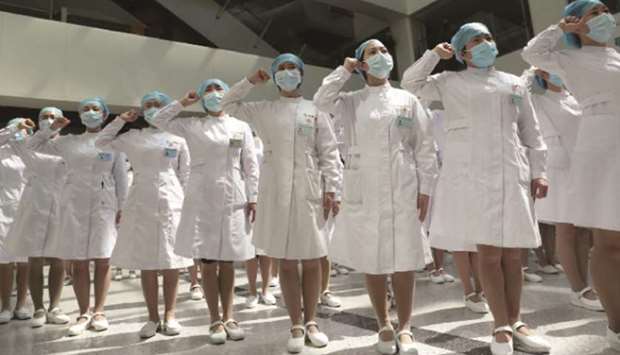Chinese health authorities yesterday called for vigilance to be maintained against the novel coronavirus as new clusters emerge, even though the peak of the epidemic has passed in the country where it first appeared.
In the past two weeks, new cases have been reported in seven provinces, including Hubei, the original epicentre of the outbreak late last year.
On Monday, Wuhan, capital of Hubei, reported its first cluster of infections since a lockdown on the city was lifted a month ago. The reappearance of clusters suggested that counter-epidemic measures could not be relaxed, Mi Feng, spokesman at the National Health Commission, told a media briefing. While prevention and control efforts had normalised, that did not mean measures could be eased, Mi said.
As of Monday, mainland China had 115 current confirmed cases, while 5,470 people were under medical observation for signs of novel coronavirus infection. A major worry is asymptomatic cases -- people who show no clinical signs of infection but spread the virus. The number of such cases is not known as they only appear on the radar of health authorities when they show up in tests.
In Beijing, where just 13 cases are still being treated, health authorities also warned against complacency. “Even after the 13 patients have recovered and have been discharged from hospital, that does not mean there is zero risk afterwards,” Lei Haichao, head of the Beijing Health Commission, told a media briefing. Beijing was among the few places in China that upheld strict rules on screening, testing and quarantine. It even stopped all international flights from landing in the city directly.
But now China has to strike a balance between maintaining a degree of public health control and easing restrictions where it is deemed safe to do so and returning society and the economy to some state of normalcy.
“The sealing of the city was once an extremely effective method for us in dealing with the epidemic, but now we need to find a balance between economic recovery and epidemic prevention and control,” Lei said.
The government has allowed cinemas, museums and other recreational venues across the country to gradually reopen, a move welcome by a virus-hit services sector. But performance venues must keep their operating capacity at no more than 30%, the China Culture Administration Association said.
The operating capacity of internet bars and entertainment venues should be capped at less than 50%, it said.
Shanghai Disneyland reopened on Monday for the first time in three months, but restricted daily visitor numbers to 20% of capacity.

Nurses wearing face masks take part in an event held to mark the International Nurses Day, at Wuhan Tongji Hospital in Wuhan, the Chinese city hit hardest by the coronavirus disease (Covid-19) outbreak, in Hubei province, China.
